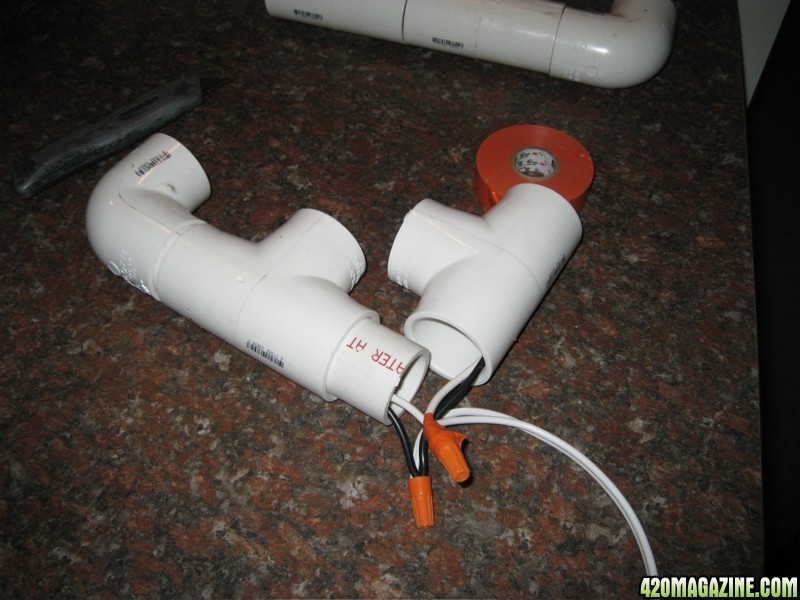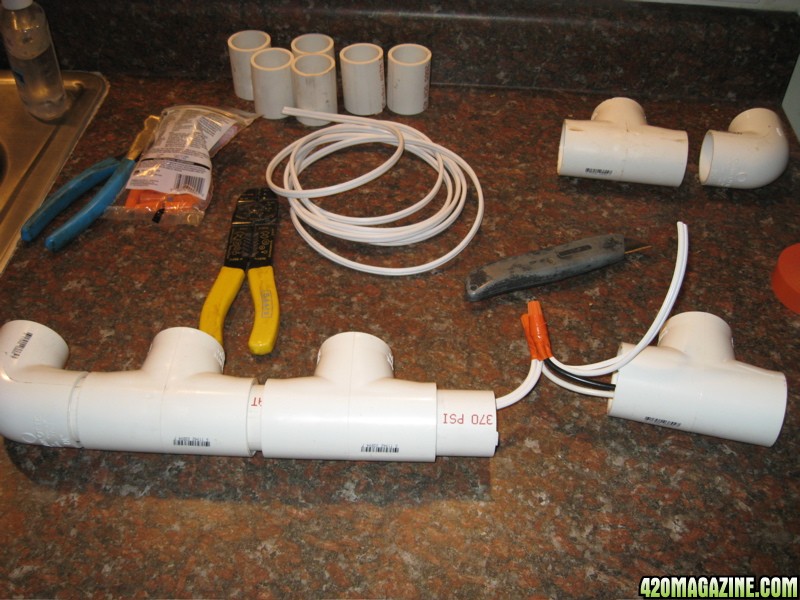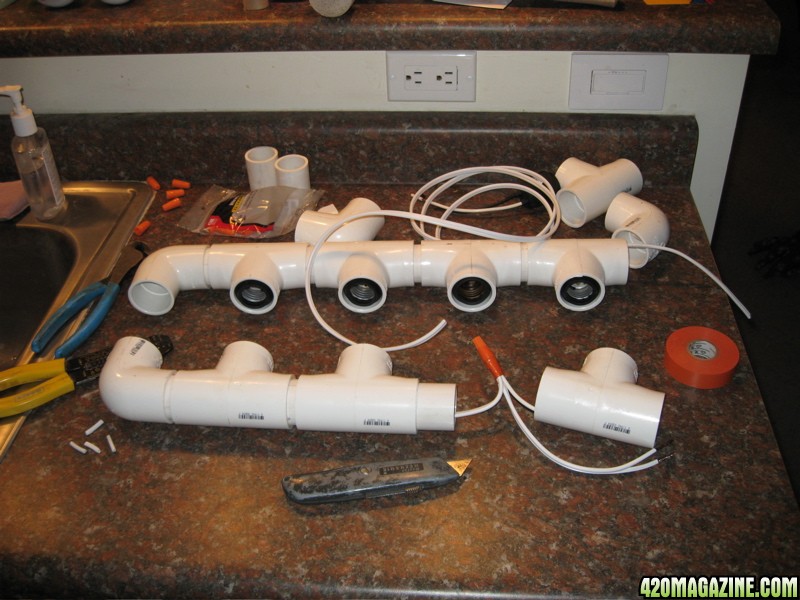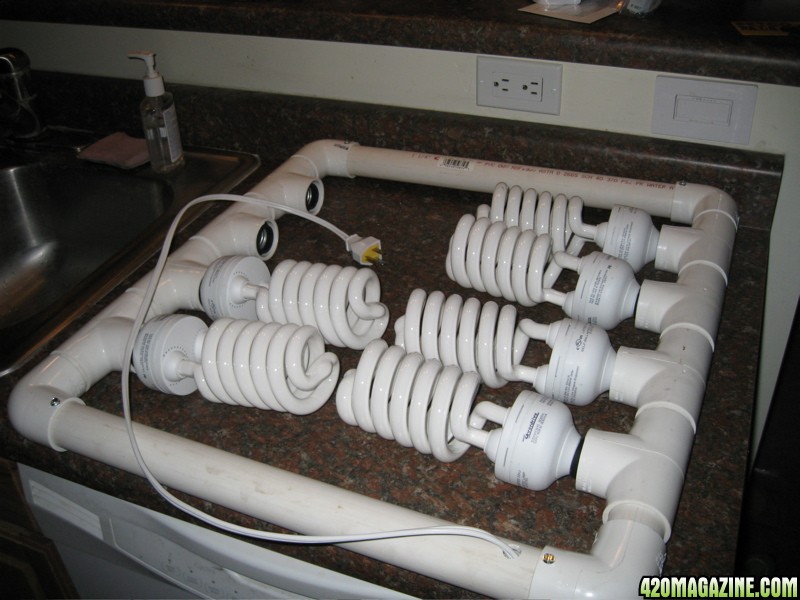Allow me to share some information with you about Lights, especially CFLs.
(Compact Flourscent Lights)
This will include HOW MUCH LIGHT DO I NEED?
CFLs vs HID Lights
If you want to start an argument fast, then visit an Internet Grow Forum or Chat Room and mention CFLs vs HID Lights. (HID Lights = High Intensity Discharge Lights)
Let me just tell you a fact. HID Lights (High Intensity Discharge Lights) are much more efficient than CFLs (Compact Fluorescent Lights) and they grow FASTER and penetrate a large plant much better than CFLs do. HID lights grow tighter denser buds too. That is a fact no one should argue. HIDs win easily.
Wait a minute. What costs more to purchase? What requires a fancier Reflector and costs more to hang? What cost more to use and adds more to the electric bill? What cost more to handle the HEAT? What do I have to VENT? What will VENTING cost?
HEAT? VENTING? I can touch a 200 watt CFL for ten seconds and not burn my hand. I can hold a burning 42, 65, or 85 watt bulb in my hand for five seconds and not get burnt. I can touch a HID bulb for half a second and have a serious blister and burn. Touching a HID bulb is like touching the burner on an electric stove. If you use HID bulbs, not only will you have to cool the bulb, you will have to cool the grow area too. Growing with HID lights requires VENTING the HEAT, and that cost extra money, BIG MONEY.
If you are a large scale grower, or commercial grower, HID lights are best for you.
If you are a small grower, a closet or tent grower, an occasional grower, a small scale personal use grower, then CFLs are your best, easiest, cheapest way to grow.
As I mentioned, I like the cheaper CFLs because of their mobility and ease of use. When I did my first grow over three years ago, a 65 watt CFL bulb was the largest made and sold. Today I see up to 300 watt CFLS, but I do not advise using the larger watt CFL bulbs.
Let me share a magazine article with you about Lighting.
From Ed Rosenthal:
In the new Skunk Magazine there was a question in the "Ask Ed" section that just made my night last night when reading it...
The Question Was:
I intend to grow a single cannabis plant in a space 1' x 2'. What light would you recommend? I was think of using four 30-watt compact fluorescent lamps. Will this be enough? Cost isn't an issue but I am deterred from getting a high pressure sodium [light] because of the amount of heat the bulb produces.
The Answer Is:
As you mentioned, you have several lighting systems to choose from, including compact fluorescents and high pressure sodium (HPS) lamps. Among HPS lamps you have a choice between a single 100-watt lamp which uses a total of about 120-watts and emits about 8,800 lumens(73 lumens per watt) or a 150-watt lamp, which uses about 180 watts and emits almost double that-15,800 lumens (87 lumens per watt).
A 42-watt compact fluorescent (CFL) emits about 2700 lumens(64 lumens per watt). Four 42 watt CFLs use 168 watts and emit 10,800 lumens. Other size CFLs have a similar efficiency.
However, that is only part of the story. Plants use mostly red and blue light. Yellow and green light is of little use to them, so light that is emitted in these spectrums is wasted energy. Most of the light emitted by HPS lamps is in the yellow spectrum. Only a small amount of the emitted light is in the orange or red spectrums, which plants use efficiently. Warm white fluorescents (2700 Kelvin) emit a greater portion in the red and orange sectors.
Although fluorescents produce only about 75% of the light per watt that the HPS does, the amount of light usable by the plant is equal or probably higher with the fluorescents. You may wish to experiment to see if adding a single cool white CFL to replace one warm white results in shorter, stouter stems and more vigorous growth. The reasoning is that warm whites don't emit much blue light, which the plants use for photosynthesis and to regulate their growth. The cool white bulb supplies the blue light.
My call for your unit would be to use several (three to five) CFLs with a total input of between 120-160 watts. Although the 150 watt HPS is a bit more efficient that the CFLs in total output, watt for watt the fluorescents provide as much useful light as the HPS lamp. Heat is another consideration. The HPS runs much hotter and emits more heat than the flourescents.
Make sure to use reflective material around the garden so that any light escaping the garden is reflected back to the plants. Any light that doesn't get to the plant leaves is wasted.
Look at a lumen/watt ration of various CFL's. The higher the wattage of CFLs, the lower the lumen/watt ratio. This chart was submitted by Jerry Garcia, a grow buddy from another grow site, and edited for typos.
For example...
the 200w listed at 9250 lumens for a lumens/watt ratio of 9250/200=46.25
the 150w is listed at 7500 lumens for a l/w ratio of 7500/150=50
the 125w is listed at 6500 lumens for a l/w ratio of 6500/125=52
the 42w are listed for 2700 lumens, l/w ratio of 2700/42=64.28
I have some 26w that give off 1700 lumens for a l/w ratio of 1700/26=65.38
GE lists some 13w that give off 825 lumens for a l/w ratio of 825/13=63.46
So, according to these numbers the most efficient bulbs for growing are the 26w that emit 1700 lumens. If you used 8 26w bulbs (208 watts total) you'd be getting 13,600 lumens...4,350 more lumens than a single 200 watt CFL. AND the eight 26 watt bulbs would cost less than the one 200 watt bulb.
I suppose you need to purchase more sockets and cords and things to support 8 bulbs, but in the long run more lower watt CFLs seem like the way to go.
(Compact Flourscent Lights)
This will include HOW MUCH LIGHT DO I NEED?
CFLs vs HID Lights
If you want to start an argument fast, then visit an Internet Grow Forum or Chat Room and mention CFLs vs HID Lights. (HID Lights = High Intensity Discharge Lights)
Let me just tell you a fact. HID Lights (High Intensity Discharge Lights) are much more efficient than CFLs (Compact Fluorescent Lights) and they grow FASTER and penetrate a large plant much better than CFLs do. HID lights grow tighter denser buds too. That is a fact no one should argue. HIDs win easily.
Wait a minute. What costs more to purchase? What requires a fancier Reflector and costs more to hang? What cost more to use and adds more to the electric bill? What cost more to handle the HEAT? What do I have to VENT? What will VENTING cost?
HEAT? VENTING? I can touch a 200 watt CFL for ten seconds and not burn my hand. I can hold a burning 42, 65, or 85 watt bulb in my hand for five seconds and not get burnt. I can touch a HID bulb for half a second and have a serious blister and burn. Touching a HID bulb is like touching the burner on an electric stove. If you use HID bulbs, not only will you have to cool the bulb, you will have to cool the grow area too. Growing with HID lights requires VENTING the HEAT, and that cost extra money, BIG MONEY.
If you are a large scale grower, or commercial grower, HID lights are best for you.
If you are a small grower, a closet or tent grower, an occasional grower, a small scale personal use grower, then CFLs are your best, easiest, cheapest way to grow.
As I mentioned, I like the cheaper CFLs because of their mobility and ease of use. When I did my first grow over three years ago, a 65 watt CFL bulb was the largest made and sold. Today I see up to 300 watt CFLS, but I do not advise using the larger watt CFL bulbs.
Let me share a magazine article with you about Lighting.
From Ed Rosenthal:
In the new Skunk Magazine there was a question in the "Ask Ed" section that just made my night last night when reading it...
The Question Was:
I intend to grow a single cannabis plant in a space 1' x 2'. What light would you recommend? I was think of using four 30-watt compact fluorescent lamps. Will this be enough? Cost isn't an issue but I am deterred from getting a high pressure sodium [light] because of the amount of heat the bulb produces.
The Answer Is:
As you mentioned, you have several lighting systems to choose from, including compact fluorescents and high pressure sodium (HPS) lamps. Among HPS lamps you have a choice between a single 100-watt lamp which uses a total of about 120-watts and emits about 8,800 lumens(73 lumens per watt) or a 150-watt lamp, which uses about 180 watts and emits almost double that-15,800 lumens (87 lumens per watt).
A 42-watt compact fluorescent (CFL) emits about 2700 lumens(64 lumens per watt). Four 42 watt CFLs use 168 watts and emit 10,800 lumens. Other size CFLs have a similar efficiency.
However, that is only part of the story. Plants use mostly red and blue light. Yellow and green light is of little use to them, so light that is emitted in these spectrums is wasted energy. Most of the light emitted by HPS lamps is in the yellow spectrum. Only a small amount of the emitted light is in the orange or red spectrums, which plants use efficiently. Warm white fluorescents (2700 Kelvin) emit a greater portion in the red and orange sectors.
Although fluorescents produce only about 75% of the light per watt that the HPS does, the amount of light usable by the plant is equal or probably higher with the fluorescents. You may wish to experiment to see if adding a single cool white CFL to replace one warm white results in shorter, stouter stems and more vigorous growth. The reasoning is that warm whites don't emit much blue light, which the plants use for photosynthesis and to regulate their growth. The cool white bulb supplies the blue light.
My call for your unit would be to use several (three to five) CFLs with a total input of between 120-160 watts. Although the 150 watt HPS is a bit more efficient that the CFLs in total output, watt for watt the fluorescents provide as much useful light as the HPS lamp. Heat is another consideration. The HPS runs much hotter and emits more heat than the flourescents.
Make sure to use reflective material around the garden so that any light escaping the garden is reflected back to the plants. Any light that doesn't get to the plant leaves is wasted.
Look at a lumen/watt ration of various CFL's. The higher the wattage of CFLs, the lower the lumen/watt ratio. This chart was submitted by Jerry Garcia, a grow buddy from another grow site, and edited for typos.
For example...
the 200w listed at 9250 lumens for a lumens/watt ratio of 9250/200=46.25
the 150w is listed at 7500 lumens for a l/w ratio of 7500/150=50
the 125w is listed at 6500 lumens for a l/w ratio of 6500/125=52
the 42w are listed for 2700 lumens, l/w ratio of 2700/42=64.28
I have some 26w that give off 1700 lumens for a l/w ratio of 1700/26=65.38
GE lists some 13w that give off 825 lumens for a l/w ratio of 825/13=63.46
So, according to these numbers the most efficient bulbs for growing are the 26w that emit 1700 lumens. If you used 8 26w bulbs (208 watts total) you'd be getting 13,600 lumens...4,350 more lumens than a single 200 watt CFL. AND the eight 26 watt bulbs would cost less than the one 200 watt bulb.
I suppose you need to purchase more sockets and cords and things to support 8 bulbs, but in the long run more lower watt CFLs seem like the way to go.



















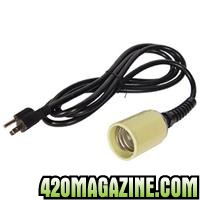
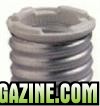
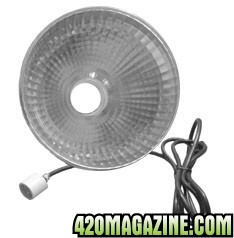


 for the great info! Rep if I could. 5 stars at least.
for the great info! Rep if I could. 5 stars at least.




